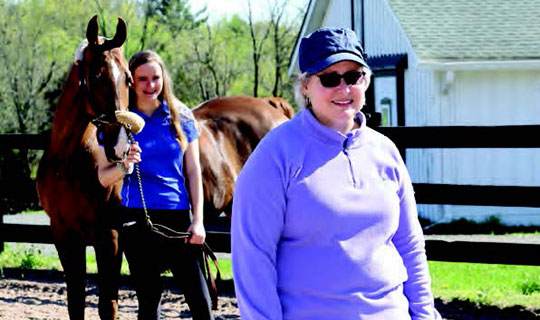“Before these drugs were approved by the Food and Drug Administration, my prognosis would have been very different.”

One Breast Cancer Patient’s Experience in a Clinical Trial.
During her recent battle with an aggressive type of breast cancer, Lori Monaghan was prescribed two medications, which she credits with helping to save her life. Her cancer was HER2 positive, meaning the protein HER2 was present, increasing the chances that the disease could spread and return. The medications target the tumor’s HER2 receptors and slow its growth. “Before these drugs were approved by the Food and Drug Administration, my prognosis would have been very different,” says Lori, 49, who lives in Branchburg with her husband, 19-year-old son and 16-year-old daughter. “Thank goodness women agreed to participate in the clinical trials that led to the drugs’ approval.”
When Lori learned she was eligible to participate in a clinical trial at Steeplechase Cancer Center at Robert Wood Johnson University Hospital (RWJUH) Somerset, she didn’t hesitate. “My thought was, How can I give back? If my daughter or one of my nieces is diagnosed in the future, I’d like to help improve the standard of care,” says Lori, who works for a pharmaceutical company. Lori enrolled in a clinical trial investigating whether breast cancer patients with one to three diseased underarm lymph nodes should have at least eight nodes removed after chemotherapy, which is standard practice, or fewer nodes—only the suspicious ones.
In both groups, radiation treatment would follow. The hope is that by removing fewer lymph nodes, patients would be less likely to develop lymphedema, which occurs when surgery causes fluid to build up in the arm, chest and other tissues, leading to swelling and pain and, sometimes, restricting movement.
Advancing breast cancer treatment
The clinical trial, which aims to enroll more than 2,900 patients at more than 1,100 institutions, is one of approximately 25 trials for various types of cancer that are underway at any given time at RWJUH Somerset, says Siby Varughese, RN, director of community oncology research at the Cancer Center. “We enroll, on average, about 20 percent of our cancer patients in trials,” she says.
Last year, the landmark TAILORx breast cancer study—which involved 14 women from Steeplechase Cancer Center—showed that many early stage breast cancer patients with HER2-negative cancer don’t benefit from chemotherapy in addition to hormone therapy after surgery. Deborah Toppmeyer, Chief Medical Officer and Director of the Stacy Goldstein Breast Cancer Center at RWJUH Somerset’s partner, Rutgers Cancer Institute of New Jersey, was one of the key collaborators on the TAILORx study. “It was a pivotal trial, and we’re proud that our patients contributed to the findings,” says Varughese.
After Lori’s diagnosis, cancer cells were found in one lymph node—a tiny organ that helps to fight infection— in her left armpit, so she was given chemotherapy prior to her double mastectomy, which was performed in October 2018. The breast surgeon tested her lymph node tissue during the surgery. There were no signs of cancer, so only two nodes were removed. After the surgery, however, pathology results revealed residual cancer in one lymph node.
Lori had to decide whether to re-enter the clinical trial and have surgery to remove more lymph nodes, then undergo radiation—or just have radiation. She consulted with her breast surgeon, Deborah Lue, MD, of RWJ Physician Enterprise’s Steeplechase Breast Specialists and medical director of the Cancer Center’s Sanofi US Breast Care Program, and chose not to proceed with the next step of the study, which would involve further removal of nodes. “At that point, I was recovering from surgery and didn’t want to risk having more nodes removed,” she says.
Top-notch care
Clinical trial participants and the people who care for them are increasingly seen as partners in research. Lori says she benefited from the experience: In addition to the satisfaction that came from participating, she says she received excellent care. “Patients in clinical trials are closely monitored,” says Varughese. “A research nurse follows them, and patients play a more active role in their health care.” Lori completed radiation therapy in December 2018. In June, she finished receiving infusions of the medications she had been taking. She’s taking another drug that can help reduce the risk of a recurrence. This summer, Lori will have reconstructive surgery.
Lori is grateful for her care team—the medical oncologist, radiation oncologist, breast surgeon, plastic surgeon, nurses, dietitian, social worker and the Sanofi US Wellness Boutique, which offers wigs and other items for cancer patients. “The Cancer Center has provided amazing care,” she says. “They offer everything you’d find at a larger center but with an approach and setting that feels like home.”
Clinical trials at RWJUH Somerset
Last year, more than 220 patients were enrolled in clinical trials at Robert Wood Johnson University Hospital (RWJUH) Somerset through a partnership with Rutgers Cancer Institute of New Jersey, the state’s only National Cancer Institute-Designated Comprehensive Cancer Center and one of only 50 in the nation.
In cancer clinical trials, researchers study new and improved options for prevention, screening, treatment, quality of life and survivorship. A major advantage of participating is that “patients may receive access to a cutting-edge therapy before it becomes the standard of care,” says Siby Varughese, RN, director of community oncology research at Steeplechase Cancer Center. Eligibility for a trial depends on specific criteria, such as the type and stage of a person’s disease, previous treatment history, other medical conditions, age and gender.
To learn more about clinical trials at RWJUH Somerset, call 908.685.2481 or visit www.rwjbh.org/clinical-trials.